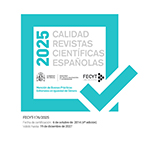Intención emprendedora en estudiantes universitarios en Chile: el rol de la formación y la educación en emprendimiento
Resumen
INTRODUCCIÓN. La formación en emprendimiento y su impacto en la intención por emprender en universitarios es una temática que ha cobrado relevancia durante los últimos años. El objetivo de este estudio es analizar la relación entre la formación emprendedora y la intención por emprender. MÉTODO. Para ello, se aplicó un instrumento de medición en una muestra de 286 estudiantes universitarios chilenos. En el procesamiento estadístico, se validó psicométricamente el constructo basado en la Teoría del Comportamiento Planificado (TCP) y se utilizaron estadísticas inferenciales para analizar la existencia de diferencias entre la intención emprendedora y las modalidades de programas de formación en emprendimiento. RESULTADOS. Los resultados muestran que existen diferencias positivas atribuibles a la educación emprendedora. Así, el haber cursado asignaturas relacionadas al emprendimiento muestra diferencias significativas sobre la intención por emprender, las actitudes empresariales y la capacidad percibida del estudiantado. También, se encontró que el participar de experiencias prácticas en emprendimiento muestra diferencias significativas en todas las dimensiones de la TCP por lo que parecen ser eficaces en la modificación de la conducta por emprendimiento en los estudiantes. DISCUSIÓN. Se discuten las implicancias de los resultados, en términos de la importancia de la formación práctica y la oferta de cursos adicionales al curriculum obligatorio en emprendimiento. Finalmente, como líneas futuras de investigación se considera pertinente explorar las dimensiones de actitud y autoeficacia emprendedora, considerando el impacto que tiene la formación en emprendimiento sobre estas variables.
Descargas
Descarga artículo
Licencia
La Revista Complutense de Educación, para fomentar el intercambio global del conocimiento, facilita el acceso sin restricciones a sus contenidos desde el momento de su publicación en la presente edición electrónica, y por eso es una revista de acceso abierto. Los originales publicados en esta revista son propiedad de la Universidad Complutense de Madrid y es obligatorio citar su procedencia en cualquier reproducción total o parcial. Todos los contenidos se distribuyen bajo una licencia de uso y distribución Creative Commons Reconocimiento 4.0 (CC BY 4.0). Esta circunstancia ha de hacerse constar expresamente de esta forma cuando sea necesario. Puede consultar la versión informativa y el texto legal de la licencia.











